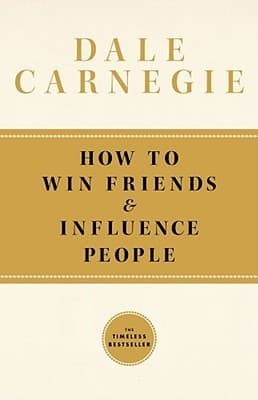
Book Review Summary: How to Win Friends AND Influence People by Dale Carnegie
Introduction
"How to Win Friends and Influence People" by Dale Carnegie is a timeless classic that has stood the test of time. First published in 1937, this book has sold millions of copies and continues to be relevant today. Carnegie's insights into human nature and his emphasis on the importance of communication and empathy make this book a must-read for anyone seeking to improve their interpersonal skills. In this article, we will explore the book's key themes, analyze readers' opinions, and summarize the reasons why it is recommended and not recommended.
About Dale Carnegie
Dale Carnegie was an American writer and lecturer who developed famous courses in self-improvement, salesmanship, corporate training, public speaking, and interpersonal skills. Born in poverty on a farm in Missouri, Carnegie overcame his humble beginnings to become a successful author and speaker. His book "How to Win Friends and Influence People" is a testament to his ability to understand human nature and communicate effectively.
Analysis of Views
- Timeless relevance: Many readers appreciate the timeless nature of the book, finding that the principles outlined in it are still applicable today. They appreciate the way Carnegie presents ideas that are not tied to specific time periods or cultural contexts.
- Practical techniques: Readers find the techniques presented in the book to be practical and easy to apply. They appreciate the emphasis on genuine interest in others, honesty, and ethical behavior. The book provides readers with actionable steps to improve their communication skills and build stronger relationships.
- Effective leadership: Many readers find the book valuable for its insights into effective leadership. Carnegie's emphasis on empathy, understanding others' perspectives, and building trust resonates with readers who want to lead with integrity and influence others positively.
- Limited applicability: Some readers feel that the book's focus on winning friends and influencing people can be limiting. They argue that true friendships require more depth and mutual respect than the techniques outlined in the book can provide. Additionally, some readers feel that the book's advice can come across as manipulative or insincere.
- Outdated language: A few readers find the language used in the book to be outdated, which can make it challenging to engage with the content fully. However, many readers appreciate the timeless wisdom contained within the pages, even if the language seems archaic at times.
Reasons for Recommendation
- Timeless principles: The book's timeless principles make it a valuable resource for anyone seeking to improve their interpersonal skills. The emphasis on genuine interest, honesty, and empathy remains relevant today and can help individuals build stronger relationships in both personal and professional contexts.
- Practical techniques: The practical techniques presented in the book provide readers with actionable steps they can take to improve their communication skills and influence others effectively. The techniques are easy to understand and implement, making them accessible to readers of all backgrounds.
- Insights into leadership: The book offers valuable insights into effective leadership, emphasizing the importance of understanding others' perspectives, building trust, and leading with integrity. These principles can benefit both aspiring leaders and those seeking to navigate complex interpersonal dynamics within their organizations.
Reasons for Not Recommendation
- Manipulation concerns: Some readers find the book's focus on winning friends and influencing people to be manipulative or insincere. They argue that following the techniques outlined in the book may lead to superficial relationships rather than genuine connections with others.
- Limited applicability: A few readers feel that the book's focus on winning friends and influencing people is too narrow and does not address the complexities of deeper relationships. They argue that true friendships require more depth and mutual respect than the techniques presented in the book can provide.
Conclusion
"How to Win Friends and Influence People" by Dale Carnegie remains a timeless classic that continues to resonate with readers today. While some readers appreciate its practical techniques and timeless principles, others find its focus on winning friends and influencing people limiting or manipulative. Ultimately, whether one recommends this book depends on their personal perspective on interpersonal relationships and their willingness to adopt Carnegie's approach to communication and leadership.